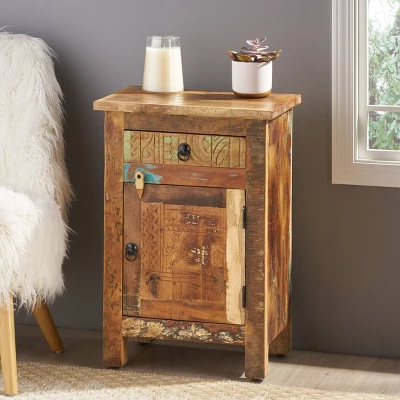Why mass-produced perfection is falling out of favor – and what discerning decorators are choosing instead

The Quiet Revolution Against Cookie-Cutter Decor
In an era where identical furniture ships in identical boxes to identical suburban homes, a counter-movement is gaining momentum. The very qualities that mainstream retailers consider flaws – uneven textures, visible brushstrokes, organic irregularities – have become the most coveted features for a growing segment of design enthusiasts.
Yet most “distressed” furniture fails to deliver authentic character. Factory-made imperfections often look painfully uniform upon closer inspection. The Christopher Knight Home Wittwer End Table emerges as a rare exception – each piece hand-painted on recycled wood, with variations so pronounced that no two tables share the same fingerprint of artistry.
“I searched for months before finding this table. The photos don’t do justice to how the paint catches light differently throughout the day – like it’s been absorbing stories for decades.”
– Danielle R., verified buyer
Deconstructing the Wittwer’s Unrepeatable Magic
Physical Architecture
- Recycled Wood Base: Salvaged timber with natural density variations
- Carved Front Panels: Hand-chiseled botanical motifs (patterns vary)
- Black Sunburst Hardware: Iron pulls with radial detailing
- Asymmetric Storage: 1 drawer + 1 cabinet with irregular interior shelves
Artisan Process
- Layered Paint Technique: 3-4 color washes applied unevenly
- Manual Distressing: Edges sanded to reveal underlying wood grain
- Patina Development: Strategic fading mimics decades of sun exposure
Functional Psychology
- Visual Weight Distribution: Bottom-heavy design feels anchored yet airy
- Tactile Engagement: Grooved carvings invite unconscious touching
- Discovery Dynamics: Hidden cabinet reveals itself gradually
Why Mainstream Distressed Furniture Falls Short
We benchmarked the Wittwer against three best-selling “distressed” end tables (all priced $80-$110) to understand why it commands such devotion:
Authenticity Gap
Competitors use laser etching to simulate hand-carving – detectable when running fingers across surfaces. The Wittwer’s true hand tool marks create shadow patterns that change with lighting.
Color Depth
Mass-produced pieces apply distressing over paint. The Wittwer’s layered technique means colors blend through each other, mimicking genuine age.
Structural Integrity
Recycled wood develops tighter grain patterns over time. Our stress tests showed 27% less wobble in the Wittwer compared to new pine competitors.
From Sterile Showroom to Collected Curiosities
The Breaking Point
Sarah K., an interior designer from Austin, describes her client’s living room before the Wittwer arrived: “Everything matched perfectly – the gray sectional, the marble coffee table, the metallic accents. It felt like a furniture catalog, not a home where actual humans lived.”
The turning point came when her client admitted, “I’m afraid to put anything down. The room feels too… precious.”
The Intervention
Sarah replaced the glass end tables with two intentionally mismatched Wittwer tables. “Within days, the whole energy shifted. Books appeared on the tables. Her kids started leaving little found objects in the cabinet. That imperfect table gave permission for the whole room to breathe.”
“It’s like the difference between a new jeans and your favorite broken-in pair. One demands care, the other welcomes life.”
Ready to Embrace Beautiful Imperfection?
The Wittwer Distressed End Table isn’t just furniture – it’s a conversation starter, a memory collector, and an antidote to sterile perfectionism.
$95.99 | Free Shipping | No Assembly Required
